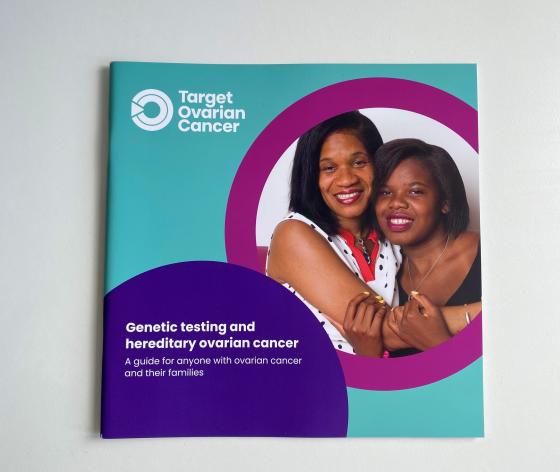If you have a diagnosis of ovarian cancer, it's a common reaction to wonder what caused it, or worry that other family members may be at risk.
Cancer is a common illness so it's not unusual to have more than one family member with the same type of cancer and/or different types of cancer within one family. But some families may have a greater chance than normal of developing ovarian cancer.
Up to 20 per cent of cases of ovarian cancer (20 in every 100) occur because of changes (a variant) to one or more genes known to increase the risk of ovarian cancer. The changed version of this gene will have been passed on from your mother or father. Some types of ovarian cancer (such as high grade serous epithelial ovarian cancer) are more likely to be caused by a variant in a gene than others (such as mucinous or germ cell ovarian cancer).
What is a genetic variant?
When a change occurs in an inherited gene it’s called a genetic variant. You might hear it called a mutation, faulty gene, altered gene, disease-causing alteration or a pathogenic variant elsewhere. But we call it a gene variant or genetic variant.
What's meant by hereditary ovarian cancer?
Hereditary means the passing on of specific characteristics down from one generation to another. In this case it means passing on a variant in a gene. The term familial means something that occurs or tends to occur in families.
Familial cancer or hereditary cancer is a cancer which has developed as a result of carrying a variant in a gene that has been passed down.
What should I consider if I have hereditary ovarian cancer?
There are a number of things to think about if you find out you have hereditary ovarian cancer.
Firstly, there's the impact on you – it may affect treatment of the ovarian cancer. Over the last few years new drugs have been developed that target ovarian cancers specifically in those with a BRCA1 or BRCA2 gene variant and you may be eligible for treatment with these drugs. You should speak to your oncologist about this.
Some hereditary ovarian cancers also increase your risk of developing other cancers, including breast cancer. So you would need to consider ways to manage this increased risk. Your medical team will support you with this.
Secondly, there could be an impact on family members who may also have inherited the gene variant, which could put them at increased risk of other cancers.
How do I know if I have hereditary ovarian cancer?
To find out whether someone has hereditary ovarian cancer (caused by carrying a genetic variant) genetic testing needs to be done.
- In England and Scotland
-
Anyone diagnosed with high grade serous epithelial ovarian cancer (the most common form of epithelial ovarian cancer) in England and Scotland is offered access to genetic testing. The genetic test may include looking for variants in the BRCA1, BRCA2, BRIP1, MLH1, MSH2, MSH6, PALB2, RAD51C and RAD51D genes, even if there’s no family history of ovarian cancer in your family. If you have a family history of ovarian cancer and you’re diagnosed with epithelial ovarian cancer you may be offered testing for the same genetic variants.
- In Wales
-
Anyone diagnosed with high grade serous epithelial ovarian cancer is offered access to genetic testing for variants in their BRCA1 and BRCA2 genes, even if they have no family history of ovarian cancer. If you have a family history of breast and/or ovarian cancer you may also be offered access to a wider test looking at other genes. There are plans to offer access to genetic testing for the same gene variants as those in England and Scotland in early 2023 so ask your treatment team what’s currently available.
- In Northern Ireland
-
Anyone diagnosed with high grade serous epithelial ovarian cancer is offered access to genetic testing for variants in their BRCA1 and BRCA2 genes, even if they have no family history of ovarian cancer. If you have a family history of breast and/or ovarian cancer you may also be offered access to a wider test looking at other genes.
You may not be eligible for genetic testing due to the specific type of cancer you have (for example mucinous, germ cell or sex cord stromal tumours). But it’s important that you discuss genetic testing with your treatment team or a genetic counsellor (a professional who is trained to talk to you about the risks and benefits of genetic testing) to find out if testing is appropriate.
Variants in genes such as BRCA1 and BRCA2 can occur in anyone in any family so a genetic variant can be inherited from either your mother or your father. They’re more common in some communities than others. For example, members of the Ashkenazi Jewish population are approximately five times more likely to have a BRCA1 or BRCA2 gene variation. This means they're more at risk of developing hereditary ovarian and/or breast cancer than people from the general population.
Tumour profile testing
All tumours have genetic variants that occur as the tumour develops. These are called somatic variants and aren’t present in the normal healthy cells of someone who has cancer. Somatic variants can’t be inherited.
When a tumour is removed during surgery, or a small sample of tissue is taken from the tumour during a biopsy, the tissue will be sent to a pathologist (a professional who studies the changes in the body’s cells caused by disease). They will study the tissue under a microscope and arrange additional tests on the tissue to profile it. This tumour profiling test gives information about the somatic variants. It can help the medical team identify which treatments the tumour is most likely to respond to, and in some cases whether you’re eligible for treatments or certain clinical trials.
The inherited genetic variants we talk about in this information which may increase the risk of developing cancer are known as germline gene variants. This is because they occur in the body’s germ cells (cells that develop into eggs and sperm). Germline variants can be passed on from parent to child when a sperm and egg come together. Both germline and somatic testing should be done if you have ovarian cancer.
Last reviewed: November 2022
To learn more about our review process, take a look at our information standards.




